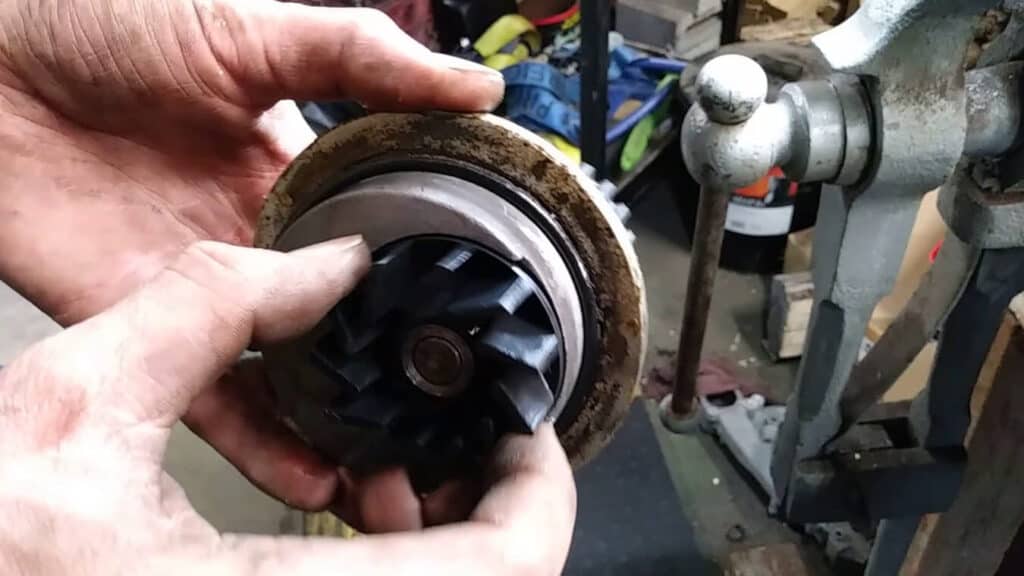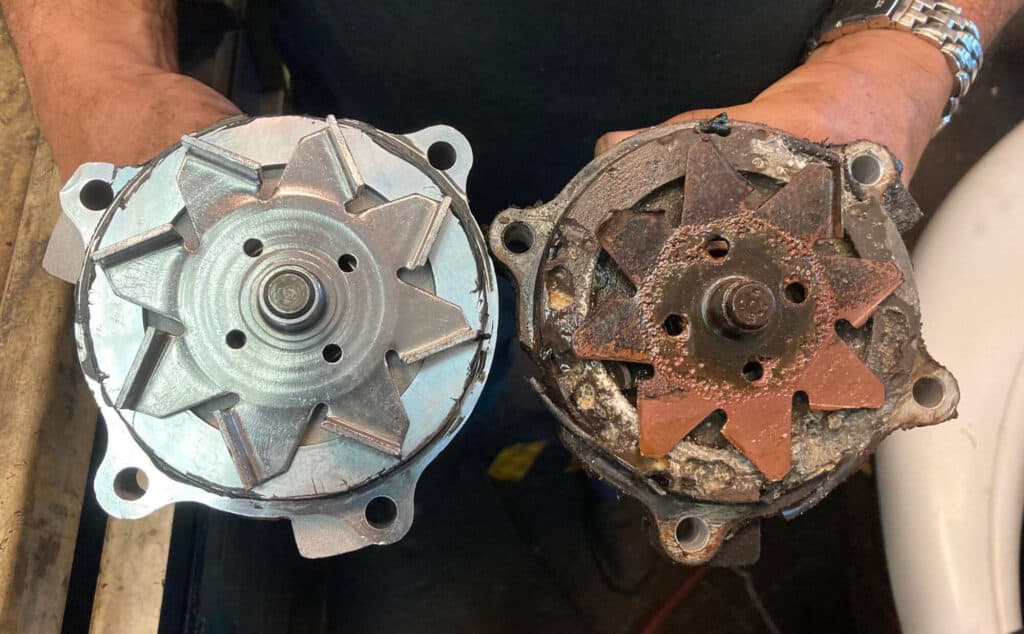Navigating the Complexities of Water Pump Diagnostics
Your vehicle’s water pump plays a crucial role in maintaining a healthy engine. It keeps the coolant flowing, preventing your engine from overheating. However, diagnosing water pump issues can be a challenging task for both vehicle owners and mechanics. Misdiagnosing water pump problems can lead to costly and unnecessary repairs. In this article, we’ll delve into the complexities of water pump diagnostics, unravel the symptoms of water pump failure, and highlight common misdiagnoses. By understanding these aspects, you can avoid the costly error of misdiagnosing your water pump issues.
Unraveling the Symptoms: Signs of Water Pump Failure
Identifying the symptoms of water pump failure is crucial for accurate diagnosis. However, these signs can sometimes be misleading, leading to misinterpretations and misdiagnoses. Here, we delve into the detailed symptoms of water pump failure and the potential pitfalls in their interpretation:
• Overheating Woes: Overheating is a classic symptom of a failing water pump, but it’s not exclusive to this issue. Vehicle owners may mistakenly attribute overheating to problems like a malfunctioning thermostat or a coolant leak. Understanding the interplay between the water pump’s circulation and the engine’s temperature regulation is key to accurate diagnosis.
• Mysterious Engine Noises: Unusual noises emanating from the engine bay, such as a high-pitched whining or grinding sound, can be disconcerting. These sounds may lead to a misdiagnosis of worn-out belts or pulleys when, in reality, they can indicate water pump issues. Recognizing that these noises can be linked to the water pump’s struggles is essential for pinpointing the problem correctly.
• Coolant Conundrum: Coolant leaks are another common symptom of a failing water pump. However, they can be deceptive, as they might appear to originate from hoses or the radiator. Vehicle owners may assume that a simple hose replacement will solve the issue, missing the underlying water pump problem. Careful inspection and consideration of the water pump’s role in the cooling system are necessary to avoid this misinterpretation.
• Misleading Simplicity: While these symptoms may seem straightforward, they can be deceptive in the context of water pump diagnostics. The interconnected nature of the vehicle’s systems means that one issue can mimic another, leading to misdiagnosis and potentially costly repairs.

The Misleading Culprits: Common Misdiagnoses in Water Pump Failures
Water pump failures can be deceptively similar to other vehicle issues, resulting in frequent misdiagnosis leading to unnecessary repairs and expenses. Here, we explore some of the most common misdiagnoses associated with water pump failures:
1. Thermostat Troubles: Overheating is a classic symptom of a failing water pump, but it’s often mistakenly attributed to a faulty thermostat. The thermostat’s role is to regulate the engine’s temperature by controlling the flow of coolant. However, if the water pump isn’t effectively circulating coolant, the thermostat can’t do its job correctly, leading to overheating issues.
2. Radiator Misconceptions: A malfunctioning water pump can also mimic symptoms of radiator problems. When the water pump fails to circulate coolant efficiently, it can result in poor heat transfer to the radiator. This may lead vehicle owners to believe that their radiator is the culprit when, in fact, it’s the water pump’s inadequate performance causing the issue.
3. Belt and Pulley Blunders: Unusual noises emanating from the engine, such as a whining or grinding sound, can be misdiagnosed as problems with worn-out belts or pulleys. These noises can be the result of the water pump struggling to function correctly. Ignoring these signs and focusing solely on the belt or pulley can lead to incomplete repairs and continued water pump issues.
4. Hoses and Radiator Ruckus: Coolant leaks are a common symptom of a failing water pump, but they can be wrongly attributed to issues with hoses or the radiator itself. When the water pump’s seal or bearing fails, it can lead to coolant leaks that may appear to originate from nearby components. Misdiagnosing these leaks can result in ineffective repairs and persistent water pump problems.
These common misdiagnoses underscore the need for a thorough assessment by a qualified mechanic when water pump issues are suspected. Professional diagnosis can help pinpoint the root cause accurately, ensuring that repairs are targeted and effective, ultimately saving vehicle owners time and money.
Installation Errors: How Incorrect Water Pump Installation Leads to Failure
Proper installation is a critical factor in the longevity and performance of a water pump. Even when a water pump issue is accurately diagnosed, the story doesn’t end there. Errors during the installation process can lead to significant problems, potentially resulting in the premature failure of the water pump or other engine-related issues. An all-too-common installation error is the improper sealing or tightening of the water pump. If the pump is not adequately sealed or tightened to the engine, it can lead to coolant leaks, decreased cooling system efficiency, and potential overheating. Another frequent mistake is neglecting to clean the mounting surface thoroughly before installation. Residual debris or remnants of old gasket material can disrupt the seal between the water pump and the engine, ultimately leading to leaks.
This highlights the vital importance of having a skilled and experienced mechanic handle water pump replacements. Professional mechanics are well-versed in the intricacies of water pump installation, ensuring that all steps are executed correctly. Their expertise minimizes the risk of errors that could result in costly repairs down the road. Therefore, entrusting the installation to a qualified mechanic is a wise decision to avoid these installation-related pitfalls and to ensure that your vehicle’s water pump functions optimally.
The Silent Failures: Diagnosing Water Pumps That Fail Without Leaking
Contrary to popular belief, the absence of visible coolant leaks does not always indicate a healthy water pump. Some water pump failures can occur without any noticeable leaks, making them challenging to diagnose for vehicle owners. These silent failures can have significant consequences if left undetected, underscoring the need for a comprehensive assessment by a qualified mechanic. One of the reasons behind silent water pump failures is an internal issue within the pump itself. Over time, the impeller, which circulates coolant, may deteriorate or break without causing visible leaks. This can lead to reduced coolant flow and overheating, potentially causing engine damage. Additionally, problems with the water pump’s bearing or shaft can contribute to silent failures. While these issues may not manifest as visible leaks, they can significantly impact the pump’s performance.
Given the complexities of diagnosing silent water pump failures, it’s crucial to rely on the expertise of a professional mechanic. These mechanics have the knowledge and tools necessary to conduct thorough inspections and identify hidden problems within the water pump. Seeking professional diagnosis and assessment when water pump issues are suspected ensures early detection of silent failures and prevents more extensive and costly damage to the engine.
Intermittent and Sudden Failures: Understanding Unpredictable Water Pump Issues
Water pumps can fail intermittently or suddenly, making diagnosis even more complex. Intermittent failures might cause overheating on occasion, while sudden failures can lead to an unexpected breakdown. These unpredictable issues emphasize the importance of professional assessment when water pump problems are suspected. Intermittent failures can be particularly challenging to pinpoint, as they may not manifest consistent symptoms. The water pump may function adequately at times, leading vehicle owners to believe the issue has resolved itself. However, these intermittent problems can resurface and disrupt the engine’s cooling system when least expected, potentially causing significant damage.
Sudden failures, on the other hand, can result in an abrupt breakdown, leaving you stranded on the road. In such cases, the water pump may fail completely without warning, causing a catastrophic loss of coolant circulation and engine overheating. Given the unpredictable nature of these failures, it is crucial to have a qualified mechanic assess your water pump if you suspect any issues. Professional mechanics can conduct comprehensive diagnostics to identify intermittent or impending failures and address them before they lead to unexpected breakdowns, saving you both time and money in the long run.

The Longevity Myth: Debunking Misconceptions About Water Pump Lifespan
Dispelling myths about the lifespan of water pumps is essential for informed vehicle maintenance. Here, we clarify the misconceptions and provide detailed insights into the longevity of water pumps:
• Lifetime Expectations: Some vehicle owners believe that water pumps can last indefinitely. However, the reality is that the typical lifespan of a water pump ranges from 60,000 to 90,000 kilometers. It’s essential to acknowledge this range and not assume that a water pump will endure for the life of the vehicle.
• Factors at Play: Several factors can influence a water pump’s lifespan. Driving habits, such as frequent towing or stop-and-go city driving, can place more strain on the water pump, potentially shortening its life. The quality of coolant used and the overall condition of the vehicle’s cooling system also play roles in determining longevity.
• Anticipating Replacement: Understanding the factors that affect water pump lifespan allows vehicle owners to anticipate when replacement might be necessary. Rather than assuming the pump will last indefinitely, a proactive approach to maintenance involves monitoring the mileage and considering the impact of driving conditions on the pump’s durability.
By unraveling the symptoms of water pump failure and dispelling misconceptions about its lifespan, vehicle owners can make more informed decisions about maintenance and avoid costly misdiagnoses and repairs.
The Path to Accurate Diagnosis and Effective Repair
In the world of automotive maintenance, accurate diagnosis is the key to effective and cost-efficient repairs. Water pump issues can be tricky to pinpoint due to their various symptoms and potential misdiagnoses. To avoid the costly error of misdiagnosing water pump problems, rely on skilled professionals for assessment and repair. At Uchanics, our mobile mechanic services in Canada prioritize accurate diagnosis and efficient solutions. Trust in the expertise of experienced mechanics to keep your vehicle’s water pump in top shape, ensuring a smooth and safe driving experience.
Understanding the complexities of water pump diagnostics and the potential for misdiagnosis is crucial for vehicle owners. By recognizing the symptoms, debunking common misdiagnoses, and relying on professional assessment and repair, you can avoid the costly error of misdiagnosing water pump issues. When it comes to dependable mobile mechanic services in Canada, Uchanics is here to provide accurate diagnosis and efficient solutions for all your vehicle’s needs.
